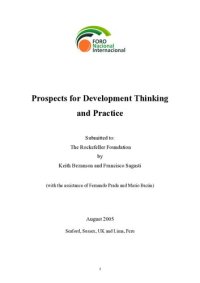
Ebook: Prospects for Development Thinking and Practice
- Genre: Science (General) // Science of Science
- Tags: Peru
- Series: Submitted to The Rockefeller Foundation
- Year: 2005
- Publisher: FORO Nacional Internacional
- City: Lima
- Language: English
- pdf
The idea of this paper originated in a conversation with Janet Maughan, Director of
the Global Inclusion Program of the Rockefeller Foundation. The conversation began with
her question on whether a new unifying idea or new meta-narrative was emerging as a sequel
to the Washington Consensus, but this soon expanded into a questioning of the basic idea of
international development itself. Why does the defining idea of development continue to
posit that all of the world’s people and societies can (and should) achieve more or less the
same material standards of living as advanced Western countries when there is so much
evidence that this is an impossibility? Are there new and alternative ideas and
conceptualizations of what it may mean to be ‘developed’? How does development deal with
the claims of the globalization enthusiasts (of whom there are many) that the world is
converging towards a Ricardo comparative advantage paradise? And how does it deal with
those who take the opposite position (of whom there are also many) that globalization is
creating a Marx army of surplus labor hell with all manner of human tragedies such as
structural unemployment, homelessness, marginalization and a clash of civilizations? What
are the prospects for development thinking and practice in these turbulent times? And do we
have the right kinds of spaces to explore and debate these questions where participants can
spend time and creative energy talking to one other rather than, as is more generally the
norm, past one another?
The upshot of the conversation was a request from Janet on behalf of the Rockefeller
Foundation that we explore these questions and prepare a synthesis paper that the Foundation
might consider in looking to the possible roles that it might play over the next few years.
This was a daunting challenge but a welcome one. It has allowed us the luxury of examining
a vast, rich and growing literature, to consult with and benefit from many very thoughtful
people, and to grapple ourselves with at least some of the most central and intriguing
questions about the human condition and its future prospects. Although our hope is that we
have managed to cast at least some light, the richness of today’s ideas and debates on
development serve to confirm in our view the elusive and illusory nature of the search for
development itself. We cannot claim, therefore, to have answered the questions that are
summarized above and that led to this project; our efforts have been compacted into a few
short weeks and the results are very much a work in progress.
the Global Inclusion Program of the Rockefeller Foundation. The conversation began with
her question on whether a new unifying idea or new meta-narrative was emerging as a sequel
to the Washington Consensus, but this soon expanded into a questioning of the basic idea of
international development itself. Why does the defining idea of development continue to
posit that all of the world’s people and societies can (and should) achieve more or less the
same material standards of living as advanced Western countries when there is so much
evidence that this is an impossibility? Are there new and alternative ideas and
conceptualizations of what it may mean to be ‘developed’? How does development deal with
the claims of the globalization enthusiasts (of whom there are many) that the world is
converging towards a Ricardo comparative advantage paradise? And how does it deal with
those who take the opposite position (of whom there are also many) that globalization is
creating a Marx army of surplus labor hell with all manner of human tragedies such as
structural unemployment, homelessness, marginalization and a clash of civilizations? What
are the prospects for development thinking and practice in these turbulent times? And do we
have the right kinds of spaces to explore and debate these questions where participants can
spend time and creative energy talking to one other rather than, as is more generally the
norm, past one another?
The upshot of the conversation was a request from Janet on behalf of the Rockefeller
Foundation that we explore these questions and prepare a synthesis paper that the Foundation
might consider in looking to the possible roles that it might play over the next few years.
This was a daunting challenge but a welcome one. It has allowed us the luxury of examining
a vast, rich and growing literature, to consult with and benefit from many very thoughtful
people, and to grapple ourselves with at least some of the most central and intriguing
questions about the human condition and its future prospects. Although our hope is that we
have managed to cast at least some light, the richness of today’s ideas and debates on
development serve to confirm in our view the elusive and illusory nature of the search for
development itself. We cannot claim, therefore, to have answered the questions that are
summarized above and that led to this project; our efforts have been compacted into a few
short weeks and the results are very much a work in progress.
Download the book Prospects for Development Thinking and Practice for free or read online
Continue reading on any device:

Last viewed books
Related books
{related-news}
Comments (0)